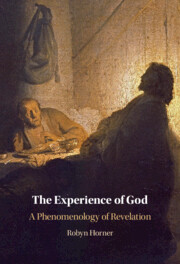
- Publisher:
- Cambridge University Press
- Online publication date:
- October 2022
- Print publication year:
- 2022
- Online ISBN:
- 9781009118729
- Subjects:
- Philosophy of Religion, Religion, Theology

Belief and credal commitment sometimes seem to make less and less sense in the West. A kind of 'cultural amnesia' has taken hold, where formal religious adherence begins to seem almost unthinkable. This is especially so for the idea of divine revelation. Robyn Horner argues this means we need to re-evaluate how theology proceeds, focusing not so much on beliefs but on experience. Exploring ways in which the experiential might open human beings up to divine possibility, the author turns to phenomenology (especially in the French philosophical tradition) because it seeks to examine unrestrictedly what is given through involved encounter. Bringing phenomenology and poststructuralism together, Horner develops the idea of revelation as an 'event' wherein God interrupts and exceeds human experience, affecting and transforming it. This striking concept, named but largely unexplored by theology, articulates a notion of supernatural revelation which now starts to appear both coherent and plausible.
‘This is a book of strong and impressive scholarship. It covers important theological territory, as it tries to come to terms with the notion of revelation and its possibility within a post-metaphysical world, using various lenses of French phenomenology especially to focus the task.'
Andrew W. Hass - University of Stirling
‘Robyn Horner's book is an able and intelligent exploration of the prospects for a phenomenology of revelation in a secular age.'
Andrew. W. Hass - Dublin City University
’This is an excellent, well-written book that could be used with students as a guide to a current debate within philosophy and theology, and offers a way of understanding revelation that has contemporary relevance.’
Gavin Flood Source: The Heythrop Journal
‘The present study not only offers an extremely stimulating outline for a phenomenology of revelation, it also allows itself to be challenged by the experiential horizons of post-secular lifeworlds. In a skillful and convincing combination of phenomenological, deconstructive and hermeneutic approaches, the author opens up a new approach to the question of revelation.’
Paul Schroffner Source: Theologie
 Loading metrics...
Loading metrics...
* Views captured on Cambridge Core between #date#. This data will be updated every 24 hours.
Usage data cannot currently be displayed.